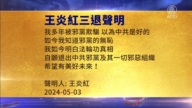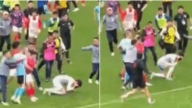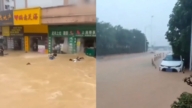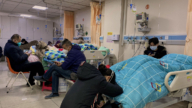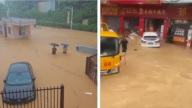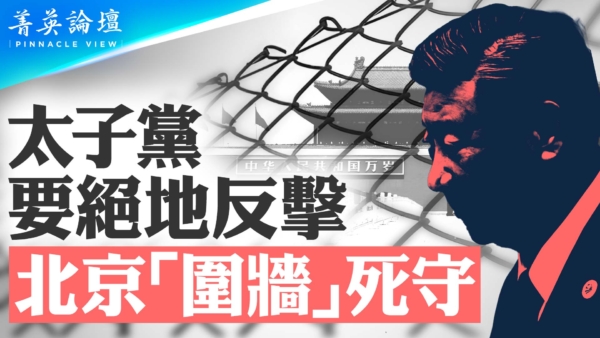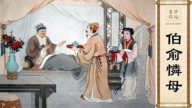【新唐人2013年02月02日讯】日前中共中央发布的“一号文件”,声称连续第十年聚焦解决“三农”问题,并说,中共始终把解决好“农业、农村、农民”问题当作重中之重。那么,为什么重中之重的问题连续十年解决不了?需要多少年才能解决?花十年还解决不了一个重中之重问题,中共还能解决什么问题?怎样才能解决中国的问题?让我们来看看。
所谓“中央一号文件”原指中共中央每年发布的第一份文件。现在已经成为中共中央重视农村问题的专有名词。中共中央在1982年至1986年连续五年,发布以农业、农村和农民为主题的“中央一号文件”,文件针对农村改革和农业发展作出所谓具体部署。
日前中共中央、国务院印发了《中共中央、国务院关于加快发展现代农业,进一步增强农村发展活力的若干意见》,这是中共中央一号文件连续第十年聚焦“三农”问题,文件中强调把解决好农业问题作为重中之重,把城乡发展一体化作为解决“三农”问题的根本途径。
中国公民监政会发起人 郭永丰:“在这个体制下,它主要是维护当权者的利益,大多数老百姓的根本问题它是不会解决的,光是口头上说重中之重,实际上没有行动,唱一些假大空的空话而已,他解决不了的。”
“一号文件”还列举了“人多、地少、水缺”的矛盾加剧,农村劳动力大量流动,农户兼业化、村庄空心化、人口老龄化等一系列问题。
前大陆历史学教授刘因全:“三农问题一直解决不了,根本的原因是这种政治体制造成的,是官员的腐败造成的,根本上说,还是要解决中共一党专制问题,强加给农民的一些枷锁才行,比如说取消农民的户口制度,允许农民自由的移动,土地私有化,买土地、卖土地都完全推到市场上去,而不是想现在这样统一由政府管理。”
“一号文件”还强调,要促进农村工业化、信息化、城镇化、农业现代化等同步发展,着力强化现代农业基础支撑。有分析认为,这些具体意见将成为习、李执政思路,尤其是李克强,早已怀揣消灭农民,企图实现农村城镇化的夙愿。
郭永丰:“城镇化未必是最好的选项,现在的社会很多人在城镇,他也梦想农村,农村的环境好,多清净,多悠闲,空气多清爽,城市的噪音污染多严重,有很多人还是希望到乡村去,现在这个社会农业依然是根本,如果没有农业,这个社会也崩溃了,也完蛋了。有些做法是独裁者个人的意志,非常片面浅薄的做法。”
刘因全指出,在过去的农村城镇化过程中,不但没有给农民带来实惠,相反,农民成了被再次盘剥的对像,在强拆的过程中,产生了大量住无居所的新生流浪群。
刘因全:“相反,农民的土地没有了,因为农民的土地被强征走了,农民成了无地的人口,而且农民按照目前的政策,又不能到城里去,到城里去又是三流公民,不能正式买房子,不能正常上学,不能正常就业,孩子上学还要交赞助费,没有正常的保险,而且农民在农村也不能正常生活,他没有土地了,这样就造成了这群贫民阶层流浪失所。”
郭永丰认为,只有进行政治体制改革,废除一党专政,让真正的人才竞争上岗、服务社会,才能解决中国各个方面的问题。
采访编辑/刘惠 后制/钟元
CCP’s 10th Consecutive Year ‘Top Priority’
Recently, the central Chinese Communist Party (CCP)
issued No.1 Document (the first policy document for 2013.)
It claims CCP spent 10 years focusing on “three rural”
issues: “agriculture, rural areas and farmers.”
In addition, it said that the CCP considered
the three issues a top priority.
However, why the top priority issues couldn’t be solved in
a whole decade? How long can it take to solve three issues?
If CCP spent 10 years on a ‘top priority’ issue, yet nothing
changed, is CCP capable of solving China’s problems?
No.1 Document refers to the first document
issued at the beginning of each year.
It becomes CCP’s tradition
to emphasize the rural issues.
From 1982 to 1986, within five years, the CCP issued five
No.1 documents on “agriculture, rural areas and farmers.”
The documents specifically designed the so-called
“plans” toward rural reform and agricultural development.
CCP published its No.1 document, “The Central CCP and
The State Council Opinions On Accelerating Modern Agricultural Industry and Rural Areas’ Development.
This is the 10th consecutive year that the CCP focuses
on solving the three rural issues in its No.1 document.
The document emphasizes those agricultural issues
have to be given a top priority.
And that integrating urban and rural development
is the fundamental way to solve the “three rural” issues.
Guo Yongfeng, founder of China Citizen Watchdog: “Under
such a system, CCP mainly focuses on its own interests.
It can’t solve most citizens’ fundamental problems.
They promised on the surface, but there is no real action.
They talk empty words, but can’t solve problems.”
No.1 document lists intensified conflicts between increased
population and lessened land, as well as the water shortage.
It talks about large-scale farmer migrant workers outflow,
part-time farming, villages hollowing, population aging, etc..
Liu Yingquan, former History Professor, Mainland China:
“Rural issues haven’t been solved, the fundamental cause is the system and the corrupt officials.
Basically, it needs to solve the one party authoritarian issues,
and the farmers’ burden.
For example, to remove farmer’s household registration
system, allowing farmers to move freely,
and to allow privatization of land, buying or selling land
on the market without the control of the government.”
No.1 document also imposes rural industrialization,
information technology, urbanization and agricultural modernization’s developing simultaneously.
Or to strengthen the basic support
for the modern agricultural industry.
Analysts believe, the detailed opinions in the document will
be Xi Jinping and Li Keqiang’s policy-making references.
Particularly Li Keqiang, he has already attempted to get rid
of the rural and urban gap, dreaming for rural urbanization.
Guo Yongfeng: “Urbanization maybe isn’t the best choice.
Many people in urban areas dream to live in the countryside,
in a good, quiet and relax environment, with a fresh air.
In the cities is too noisy, with heavy pollution,
thus many people want to move to the countryside.
In today’s society, the countryside is the base,
without agriculture, this society will collapse.
Some measures are dictator’s individual will,
they are very superficial approaches.”
Liu stressed that the process of rural urbanization in the past,
didn’t do farmers a favor, on the contrary, farmers become target of interests’ gain.
The process of demolitions resulted
in people becoming homeless on a large-scale.
Liu Yingquan: “On the contrary, farmers lost their lands.
Their farmlands are being seized. They became homeless.
In addition, the current policy doesn’t allow farmers to move
to the cities. If they do, they become the third-class citizens.
They can’t buy a house, can’t go to school, or find jobs.
If their child goes to school, they need to pay donation fees. They don’t have standard insurance either.
Thus, farmers can’t live a normal life in the countryside
without a land anymore, so they end up wondering around.”
Guo believes, only by pushing forward the political reform
and disintegrating the one-party dictatorship,
can the real talents obtain their jobs through competition,
serve the society, and China’s various problems be solved.


